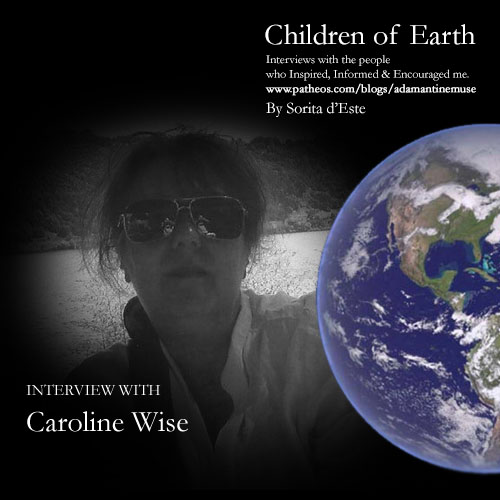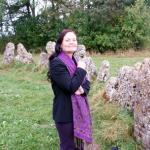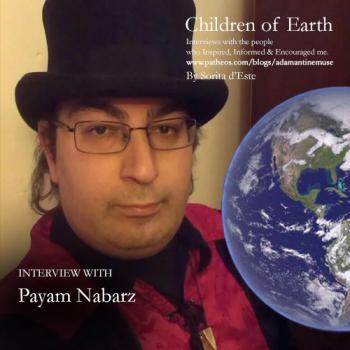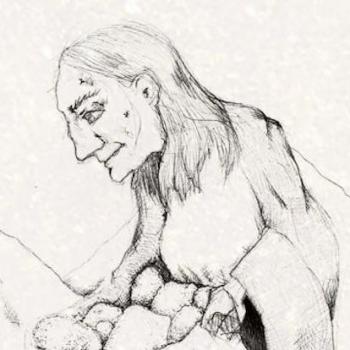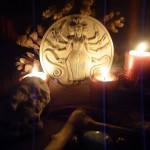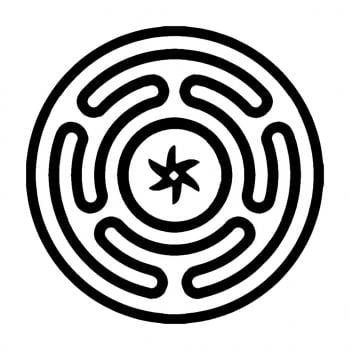Caroline Wise is well known for her work promoting Goddess spirituality, her passion for Earth Mysteries, and her extensive knowledge of occult books. She compiled the book Finding Elen, the Quest for Elen of the Ways, and is co-editor, with John Matthews, of The Secret Lore of London (Hodder and Stoughton). She has also contributed to books on Goddesses, Florence Farr, Pamela Colman Smith, and Babalon. From the 70s she was involved with the Earth Mysteries; in the 1980s, a founder member of ASSAP, and from the 1990s she put on large conferences for the Fellowship of Isis and the goddesses in London, as well as the Wildwood Conferences which looked at the crossover of ancient folklore with modern paganism.
I first met Caroline sometime in the late 1990’s after I moved to London and first discovered that there were such things as occult bookshops. I was privileged to spent some time attending a Fellowship of Isis Goddess group Caroline facilitated in London, and learned a great deal from the experience of doing devotional and oracular ceremonies to many different goddesses with her.
Today Caroline continues to give talks and workshops in UK, Germany, Italy, and USA. She has been involved in occult bookselling and publishing since 1987, and has worked for Psychic News, the Spritualist Newspaper. In 1993 she produced Florence Farr’s Egyptian-themed plays at the Rudolf Steiner Theatre, for breast cancer charity. Caroline inaugurated the republication of Kenneth Grant’s work and is associated with Starfire Publishing, also leading tours of Mythic London and the British Museum and the Awakening of Magic in the British Museum, via Treadwells Books.
In this Children of Earth Interview I ask Caroline about the importance of the resurgence in Goddess spirituality, her work with Elen of the Ways and how she feels things have changed over the years.
Interview with Caroline Wise
By Sorita d’Este
Children of Earth: People who Inspired, Informed or Encouraged me.
SORITA: You are a leading authority on the Mysteries of the Goddess in the UK and the editor of Finding Elen: The Quest for Elen of the Ways. Over the years you organised a number of magical events through which you significantly contributed to the re-awakening of the Goddess. As a priestess, you have been a guide and companion to many, including myself, seeking a more profound experiential knowledge of the Goddess. Who inspired the younger you into taking your own first steps towards the Goddess?
Caroline: There wasn’t a particular person, I had an instinct for the ‘unseen’ world since childhood, mystical and psychic experience, being in total awe of nature and the seasons, animals, birds, wild and domestic. I loved frogs, toads and newts, snakes and slowworms. My parents had interesting fine old books, from the 19th and early 20th century that they had inherited. They fascinated me – one was by Pamela Colman Smith, that had this loose print of hers of women’s heads that I used to stare in fascination at as a very young child. There were fabulous travel books of different cultures and lands, myths, magical fairy stories, and it was like entering new worlds. Always the women characters fascinated me. And there were the original Flower Fairy books. We had a weekly mythology radio broadcast at primary school, and I would be in other worlds, eyes shut, inhabiting it. Jason and the Argonauts, I was there. King Arthur? I am at the court living it. When a teacher was reading Puck of Pook’s Hill to the class, I was jolted into a magical state when Puck appeared to the children. An utterly electric experience of stepping into the story, the landscape where it is set, never forgotten. The Goddesses were a natural step. I resonated with myth and mystery, had a sensibility for it, secret and primal. The White Witch in the Lion the Witch and the Wardrobe was an early fascination, although she was the bad girl, and I loved Mr Tumnus.
I bought my first goddess statue in the mid-70s in Athens when I was 18, on the descent from the Acropolis. I knew it was a powerful thing, it exuded delicious mystery! Exotic if you like, stirring some deep magic inside. It was a plaster statue of Aphrodite on the shell, and it travelled everywhere with me as I had no settled home for a few years – bedsits, squats, friend’s sofas, shithole places, but she always came with me. I’d not long come from sleeping in Ashdown Forest.
I became involved with some Witches at that time, – it was a witch I went to Greece with – but that really was not for me. I realise now that it was those particular people who were not for me, not the whole scene; but I vowed to never join any kind of formal magical group again, but carried on a personal interaction with goddesses, magic and the earth mysteries, astrology, tarot, and so on. I was happy with that, Prediction magazine and later psychic questing with good friends. It was very fruitful and still have the same friends. I had an interest in the Golden Dawn and always saw the Isis current in that, plus Crowley and especially Kenneth Grant who became a big part of my life. The Goddess infuses his work.
Then in 1986, I was at one of the exceptional Gnostic Masses that Jean Williams and Zachary Cox presented with their Rainbow Bridge group. My friend Chesca was there, and she said ‘I really want you to meet my friend Sunflower, she is a priestess of Sekhmet’. And here was this utterly amazing woman. I’ll call her Sunflower, as she is very private. I’d had a relationship with Sekhmet since 1981, and this woman was so fab, I instantly thought, if this woman is a priestess, it is ok to be a priestess, I can do this now. I became good friends with Sunflower, and I joined the Fellowship of Isis at Chesca’s insistence, although still dragged kicking and screaming “But I don’t join anything!!”. Then I was plunged into a whole universe of working with many goddesses and became a colleague of Olivia Robertson, one of the founders of the Fellowship. She famously never taught anyone, but I certainly learned a lot by observation and listening to her, crikey I did.
SORITA: I have very fond memories of first learning about Elen of the Ways from you in London, and the passion and excitement you conveyed whenever you spoke about her. Not everyone reading this will have heard of Elen of the Ways, so can you please say a bit more about Elen and why she came to be important to you?
Caroline: Long story short: Elen of the Ways is a modern name that we gave to an enigmatic antlered goddess who was cropping up persistently in visions from the early 1980s, and in my friend Chesca’s case, amazing visions of antlered women she graced her glorious art with. Elen seemed to be associated with ancient trackways, and in those days, because I had been closely associated with The Ley Hunter, I assumed this meant the leys – those prehistoric trading routes proposed by Alfred Watkins. Leys as ways. By the late 1980s, through a series of synchronicities, I’d was convinced what we were looking for was a reindeer goddess, and in the early 90s, possibly a female elk entity as well. It was not easy in the pre-internet days. You had to mine for information. Then in 1993, a Bulgarian friend, Moni, told me that Elen meant deer in Bulgarian, and a penny dropped. It is a Deer Goddess, not necessarily one called Elen, we are looking for. Similar words mean Deer in other Eastern European languages, and over the years, I have, with the help of Andrew Collins and others, been able to trace the Deer Goddess in various guises from her origins in Siberia, across Russia and Ukraine, into Scandinavia, down into Central Asia, Eastern Europe.
Why is Elen important to me? Because she led me on this amazing quest that is meaningful to me, and seems to be to many others, especially women. Because there is an association with the old trackways, an early interest in my magical life. And because we found her origins right where she showed herself in my original spontaneous and startling vision, ‘Beyond the Steppe’. Essentially, she is the Reindeer Mother, she births the shamans. It is no surprise that there is a reindeer goddess – The reindeer people would have relied on the deer for all; clothes, tents, food, milk, transport, tools, needle and thread…and access to the magical realm for the shamen. She provided all. Had I known at the time that there was a book called the Deer Goddess in Ancient Siberia by Esther Jacobson, a Study in the Ecology of Belief, it would have an easier, but less magical ride through the land and the sky and spirit ways in finding Elen. But it was an academic book, at an academic book price. Eventually, I got one in the 2000s at over £100. Back when we started, with no google or access to academic texts, you’d follow your dreams and visions, and if they check out, great, you go onwards.
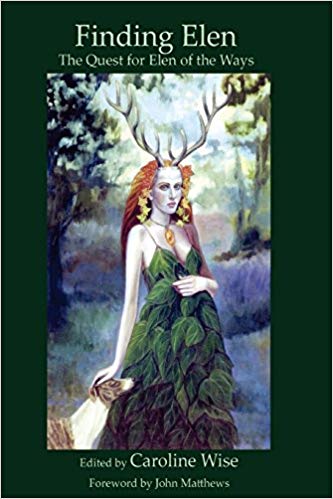
SORITA: For many decades now you have been actively involved in promoting the Goddess, both through your lectures and workshops, but also through successful conferences you organised in London in the 90s and early 00s. I know that I personally benefitted greatly from being in your Fellowship of Isis Lyceum in London, and attending some of the events you organised in the early ’00s. Indeed, speaking for myself, I know that the interest I have in particular goddesses today, especially some of the Egyptian and Babylonian ones, started during the time I was in your Goddess group in London. You have always worked so hard towards awakening love and interest in as many goddesses as possible in those around you, and so many people have benefited from that over the years.
When and why did you decide to dedicate your life towards promoting the mysteries and magic of the Goddess in the way you have been doing for the last 40 or more years?
Caroline: Really lovely to hear that you found the Fellowship of Isis work in London beneficial. We were lucky to have some great women there. I didn’t decide, it just happened naturally. It was my biggest interest. The way we worked was influenced to some degree by my working with Olivia Robertson fairly closely over the years, but the framework was my own. We’d learn about a different goddess each week, her history and myths, and most importantly, her relevance to the world and/or women today. Then we’d descend to the temple in a ‘temple state of mind’ and perform a fairly free-form but charged ceremony to that goddess based on what had been learnt. It is the best way of teaching people to be a priestess of the goddess.
I had watched with amazement when Olivia, in her own temple in Ireland, would throw newcomers in at the deep end. She did it to me. You could be a complete newcomer, just arrived off the ferry, and without any prior warning, in front of lots of people, she’d call someone’s name and say “ ‘So-and-so’will now invoke Decerto” or “ ‘So-and-so’ will now give the oracle of Hathor”. Heart-thumping, wishing you’d been invisible, you had to invoke that goddess, or bring forth an oracle – so you did. It works. She did it not to teach, but because she had no conception that others did not necessarily possess her unwavering upper-class self-confidence!
At least our group had learnt about the particular goddess first. In London, we also had the atmosphere of a dressed temple in that basement at Atlantis, thanks to my colleague Karl who would do it all earlier, but not seen by the group till they processed in. This format was to give women attending confidence to be a priestess, and to give oracles, to get to know the goddesses, and take part in ceremony without scripts – you can’t do ritual with scripts, the goddesses would lose interest!
I can’t think of anything more important than the goddesses – for women, women’s rights and equality. For the Earth and for nature and for the animals, the forests and oceans, and if humanity has a chance up ahead. I have a deep deep love of the goddesses in every cell. They are the most interesting, magical and exciting thing I can think of. We need them today more than ever before.
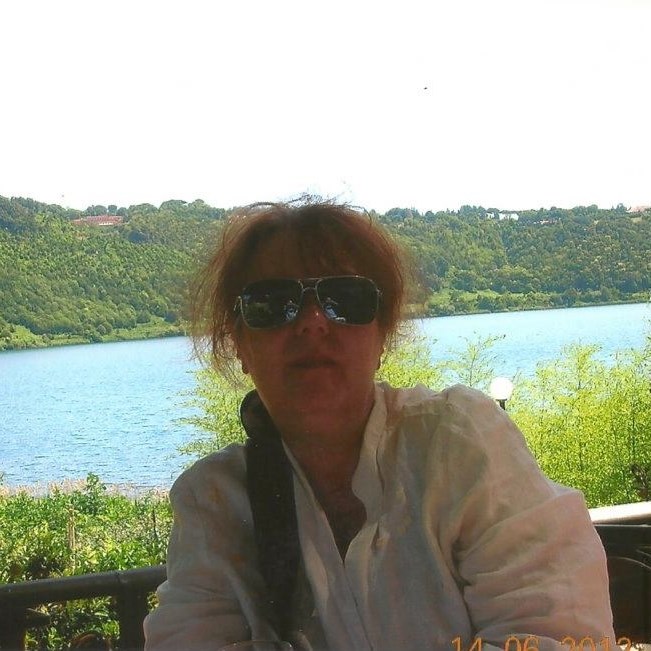
SORITA: What is the most significant lesson you have learned from the work you have done?
Caroline: That the world needs the goddesses more than ever, and that your visions and psychic impressions have to be followed and checked out. Otherwise it is meaningless channelling. It may take 30 odd years for your Eureka moment, but if it feels true, stay true to it. And take note of synchronicities, they show that you are on the right track in any magical quests or work you have immersed yourself in. And, I have learned that mythology, for me and my friends at least, is an active field, the mythspere, and if you jump into it, things will start to roll!
SORITA: The dawn of the internet in recent decades has opened up avenues for communication, interaction, the sharing of information and experiences for Pagans and Magicians in a way which has never been possible in human history. This has manifested wonderful new opportunities, but it has likewise accentuated (and possibly accelerated) some of the less pleasant aspects of the scene too. Based on your own experience, what do you think newcomers can look for as warning signs that so-called “Bitchcraft” is at work?
Caroline: Adults are responsible for their choices, but generally, stay away from people who are constantly briefing against others. If they do this bitchcraft all the time, then they are a problem and a disposal unit to your time and happiness and magical development. Use your intuition. If a group leader tells you can’t read a certain book, or speak to another person, or join other groups, leave that group. I actually had a middle-aged male customer in my Atlantis days, asking for recommendations, and when I pointed out the best book, he wailed ‘My high priestess said I am forbidden to read that author.’ Don’t be that man! Read the book!
Beware of any controlling or culty behaviour. Walk away from any priest/ess or group leader who seems to undermine you with passive-aggressive comments or with humiliating you. Don’t stay anywhere you are not happy. That is bitchcraft and it is not going to make for a magical life if you hang around that person. A most powerful magical initiation is walking out on such a person or group, because it is not easy psychologically to do so. Don’t fan-girl (or boy) people, they are just people. Respect them and their work and time served and knowledge and wisdom – if they have any. But if you put them on a pedestal, you are entirely responsible for feeling distressed if they don’t deliver eventually. Same online with social media groups. Keep your boundaries strong.
One problem I see with the social media age, is that due to phenomena like Facebook, people appear from nowhere as if springing fully-formed from the head of Zeus. Suddenly they are some kind of teacher, leader, expert, presenting charismatically online. No one has actually met them, but they gain a huge following overnight. All very Pied Piper. To those of us knocking around for decades, we wonder why have we not heard of them before? Not in a territorial way, and there is nothing wrong with new people on the block of course, or accepting that time and technology have moved on and magical ‘scene’ is growing. But to a newcomer, there is no way to know who’s who in this flat-screen-surface-internet world. Use discernment as to what and who feels ok for you. It is currently fashionable to say ‘don’t be judgemental’ but using your judgement about situations may save a lot of grief. And if in doubt, invoke Sekhmet, or Hecate, or both!
SORITA: You live and work in London, which was also my home for 11 years. London is a magical city, with magical lore and history – both modern and ancient – around every corner. Many people believe that the Gods are more at home in the countryside and in nature. What are your thoughts on this and how do you connect with your deities in a big city like London?
Caroline: In cities, there were and are lots of people, and perhaps more formal acknowledgement of gods, more formal temples – in the times there were temples. In the country there are also gods, and also temples. We are lucky in London that we know the sites of the Roman Temples, to Diana, to Mars, for instance, and have the remains of the Mithraeum. I guess gods are at home wherever they are acknowledged. I don’t really get the city/country divide some pagans project.
There is so much ‘nature’ in London, in ancient woods and parks and the shore of the River. In gardens and hedges, and in the wildflower pushing up through the concrete. I love the wildlife havens that grow along the overland railway lines in London, to see a mother fox with her cubs every year on my journey home from work lifted the heart.
London was not always a vast metropolis. Until fairly recently, The City itself was very small and much of what we call London now was farms and woods and wild-ways that the highwaymen haunted ! Where I live in London, I am 5 minutes’ walk from ancient woodland, with owls and woodpeckers, crows and an old Saxon land settlement; 20 walk from Hampstead Heath, which is vast and wild. I am 35 minutes on public transport from the British Museum, which teems with goddesses and gods, and at places like Treadwells I can see amazing lectures on magical themes. There are so many pagan events, talks, ceremonies, workshops, it is often hard to choose which one to attend on any day of the week. I feel connected to the gods all the time, and so do my friends here. I think it was Ronald who said that more gods were worshipped in the cities because there were more people there. And of course, gods and goddesses cover every aspect of the world, every job, household or farm item, plant, type of landscape. How do you connect to them in town? You invoke them. If you invoke them, they will come! But essentially, they are in your heart and head and soul.
One of the Goddesses who had a significant temple in London was the Egyptian Goddess Isis, in her Graeco-Roman guise, bought here by the Romans. She had temples all over the Roman Empire. She would be ‘at home’ in all her temples. Gods are local, gods travel, gods evolve, and gods settle thousands of miles from their origins. However, in any area you find yourself in, as a dweller or a traveller, it is always good, whether town or country, to make contact with the Genius loci, the Spirit of Place. To make such contact, to pay respects, they will perhaps open the way to finding the local gods and mythic landscape of your area.
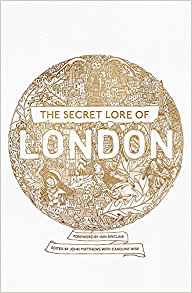
SORITA: During my time in London I primarily lived in Chiswick, which is in West London near the River Thames. I loved walking on the towpath from Kew Bridge to Richmond, visiting Richmond Park and watching the deer. It was so magical! Likewise, I thought there were several other places in London which were incredibly magical and which I feel everyone with a interest in magic should visit. I know you have an intimate knowledge of magical London and that you still lead occasional tours for magical people. Which are the three most magical places which those visiting London should put on their to-do list?
Caroline: Agree, the nature from the Towpath is amazing. My parents’ place in Barnes backed onto it. A great place to witness the turning of the wheel of the year. Seeing the baby water birds emerge, watching the cygnets hatch and grow and eventually be sent off by their parents. Watching the herons waiting for opportunities…
To see the towpath flood at spring equinox, to see kingfishers, or a seal bob up in the water, it gives a real magical frisson. And the wheel of the year can also be keenly observed with the cycle of the deer in Richmond Park. But here are my three places:
St Paul’s Cathedral is almost certainly on the site of a Temple to Diana, which takes us back to the magical myth of the founding of Britain by Brutus, at the behest of Diana. Our country and capital city was founded because of a goddess. He built his temple to her when he arrived in London via Totnes. Elizabeth 1st knew of Brutus, believed she was a descendent of him, and had the mantle of the Goddess Diana bestowed upon her by the poets. You are standing at the place where myth and history meet. You don’t need to go into the church, which is expensive, the churchyard is lovely, and the crypt takes you down into what may have been the old temple area.
Then a walk downhill, past the London Stone, our old megalith, to come to my second choice, The Tower of London, which looms over the River. It holds our darker myths, and takes us back to the legends of Bran the Blessed and his oracular head, which was buried there as a protective talisman before the scary Norman castle was built on the sacred mound, Bryn Gwyn. Go and see the ravens who protect the realm – Bran means Raven.
And number three, a modern magical phenomenon: The Cross Bones Graveyard and Gardens, a post-medieval burial site in Redcross Way, south of the River, the Badlands behind the Globe, where an exciting London pulse of the Real People beats with a Dickensian rhythm. With the ribbons and the almost talismanic items on the iron gates, it is a shrine, and testament to the vision and work of John Crow and Katy Kaos and friends. Dedicated to the Outcast Dead, it is a deeply affecting place, which has the presence of Magdalene and Isis, but also an unknown primal elemental protectress, who John Crow knows as The Goose. 15,000 bodies discovered, the poor, the prostitutes, those from the workhouse. Babies. Children. Fishermen of the River too old to work in London before welfare and when being poor was a sin. As in Ancient Egypt, only the rich get a proper burial, a marked grave and promise of an afterlife! The site now, with its garden, is a modern Blakean manifestation in London. Can’t do it justice here, so please see this link. http://crossbones.org.uk
SORITA: Each generation has their own needs, desires and unique situation. The world today looks very different from how it was 100, let alone 1000 years ago. Do you feel that different deities are relevant to different generations? And if so, which deities do you feel are most relevant in the here and now and why?
Caroline: OK, well yes, a very difficult to answer because there are millions of deities, and millions of us have different preferences, callings, contacts or reasons for seeing them as relevant. As you say, their own needs, desires and unique situations. Currents ebb and flow. Can only speak for what I see in UK, parts of Europe and USA. Who resonates in our time?
The goddesses that women seem to be responding to these days are particularly Sekhmet and Hecate. Brigid, Isis and Diana seem as popular as ever. Powerful in nature, powerful in magic. I have noticed Athena is on the rise, especially among scholarly women. In the USA, particularly, African origin Goddesses are becoming more visible. Yemaya and Oshun for instance. I am hearing about Lakshmi more. Ganesh seems to be everywhere, a god for our time, beloved of so many. Gwyn AP Nudd is rising again, I note. Babalon is coming into her own as women are raising her up right now. Women are claiming Babalon, freeing her in some ways from male projection, for she is of the liberated woman, and those responding to the zeitgeist seem to be flying high with her at the moment. There is a lot that women magicians have to say with her, (not of her) in magical arenas at the moment. We have never had such a rising of the goddesses and gods. Follow those who sing to you, though, not necessarily those in fashion.
SORITA: What does ritual and devotion mean to you?
Caroline: Ritual for me will be beautiful, uplifting, a harmonious layering of words, movement, sounds, scent, colour. It has a purpose, it can be stately or wilder Dionysian, but it has to have oomph, charge and bring change. I do less ritual these days, have no robes anymore, and never really had ritual tools, except my sistrum, which has been around the world, and the odd reindeer antler. But I occasionally work with old friends who can always give this uplifting experience. I am not keen on ‘worship’. We work with the gods. Devotion? It becomes part of you, it is inside you, integrated, and for me, it is best quiet, not flamboyant.
SORITA: Back when Levi, Mathers, Farr, Crowley, Parsons, Fortune, Gardner and all their various contemporaries were stirring their respective cauldrons for inspiration, there was very little literature available on magic, mythology and Ancient Religions. Yet, they still managed to create truly memorable and transformative ritual. Today we have a lot more information available than ever before, and it is a great deal more affordable and accessible than perhaps it has ever been too. How do you feel this has affected your own personal outlook?
Caroline: It has affected me in a really positive way. It is utterly amazing. We have a cornucopia of information, gods, magical systems and currents. We have to be careful not to take it for granted, too not be cynical, but also not to project too much fantasy onto it all, while at the same time not losing the magic and awe. And it’s sobering to realise we have more information at our fingertips from different cultures and systems, from psychology, from books and academic study and having a big, open ‘scene’, than those magical forbears you mentioned. But has that made us lose the focus they had? Still, the great treasure trove of information available now places us in the Golden Age of occultism and paganism. We are so lucky, Hail Fortuna!
SORITA: I know that you have been a long-time vegetarian, and that you are passionate about animal rights. In the last few years, it has become very trendy and acceptable to be vegetarian, and even vegan – but this has not always been the case. As a longtime vegetarian myself I have found it to be a point of friction in some Pagan circles, even though I am not an activist who “preach” about it. What effect has being a vegetarian had on your understanding and interactions with the Mysteries and your relationship with other practitioners?
Caroline: Decades ago being a vegetarian, like being into Yoga, was akin to being an evil magician. You’d be seen as a very shady character, and a barmaid or waiter would cry ‘Vegetarian?!’ in their best Lady Bracknell ‘A handbag?!’ indignation. Often there was nothing available, or perhaps you’d get a slice of hard cheese, lettuce and hostility. Mind you, when I was young, Britain was only just suspiciously sniffing around garlic and avocado, and Blue Nun was a sophisticated wine. Now in Britain at least, it is fantastic for vegetarians and vegans as far as choice goes. I do not think vegetarianism and veganism are trendy now, I see people who are really committed to it. But if it is trendy, great, the more the merrier. It has never affected my relationship with others. It seems bizarre that it may cause conflict within paganism, and if people elect to be conflicted by it, so be it, they are responsible for their own practice and responses.
SORITA: What advice would you offer the younger you just starting out?
Caroline: It would be “you know that blocking facility we have on social media? Have a blocking list in your head of anyone who behaves badly on your journey. That would have saved me a lot of grief! Also, it is all entering a new phase, a new evolution, so an interesting time to be jumping in, although the currents are strong at the moment. A lot of the old systems and structures seem to be changing, for the better, mainly. Some people don’t like the hierarchy of the old orders so much now. Have fun along the way, and find a magical way – and people – that you can love and enjoy. If you don’t love and enjoy it, don’t stay.
Use your wits, and I’d especially tell myself, actually listen to your instincts and intuition, duh! I’d also remind myself to be prepared that putting on occult plays in a real theatre will give me 19 nervous breakdowns. And that the influences from the books in my childhood home and school have to a large extent set the scene for much of my magical journey – holy wells, intriguing women and goddesses, myth, magic, Puck and Mr Tumnus.
Trivialities:
Your favourite book of all time?
You can’t do that! I have at least 200 favourite books of all time. I will say Siwa, The Oasis of Jupiter Amon by the splendidly named C. Dalrymple Belgrave. Because my parents had it when I was very young and I was fascinated by it, and it introduced me to oracles, sacred springs, women’s magic and other things that have stayed with me for life, plus a horned god decked in emeralds, folk beliefs, charms and Jinns! We all need a horned god decked with emeralds. Great intro at an early age, although that wasn’t the purpose of this non-fiction book from 1923. A lot of it is bad in the sense of how writers of that time spoke about other cultures, though. But as a nipper I only saw the delicious magic that is mentioned in parts of the text.g
Your favourite character from history?
Elizabeth 1st fascinates me, how the mantle of the moon goddesses was bestowed on her, Diana, especially. Again I think that comes from another great book my parents had when I was growing up, I loved the portraits showing the magical costumes and jewels she wore, and how interesting looking she was in.
Your favourite element?
All of them – I probably prefer Earth in one of those rituals where they have the four elements and quarters.
Your favourite food?
Currently it is cherries. You can’t beat beans on toast though. And curry.
Your favourite number?
71
Your favourite planet?
Apart from the home planet, Venus.
Your favourite plant?
Willow
Your favourite stone?
Peridot
Your favourite Tarot / Oracle deck?
The Greenwood Tarot is a work of genius in the true sense of the word. No other deck has yet surpassed it in my opinion. Chesca Potter’s art unlocks the door to primal magical currents in a beautiful and moving way, led by animals, birds, and mysterious women and deer headed beings. She has an innate understanding of symbolism and how it works on the psyche.
Your sunsign?
Depends on how I feel when I wake up. It is a good magical exercise to get into character. I can do a good Leo, but my sitting room would betray me if I was playing Virgo. I’d like to try Sagittarius, but I haven’t been able to nail it.
Thank you Caroline for taking the time to participate in this project! If you want to find out more about Caroline’s work and the subjects discussed above, get yourself copies of these publications:
— Finding Elen, the Quest for Elen of the Ways
— The Magical Writings of Florence Farr

